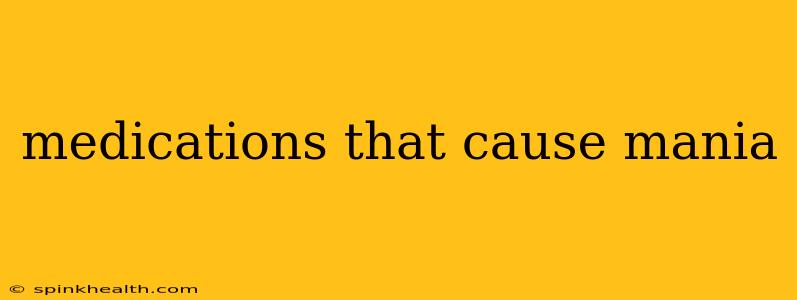Medications That Can Trigger Mania: A Comprehensive Guide
Mania, a state characterized by elevated mood, racing thoughts, impulsive behavior, and decreased need for sleep, can be a debilitating condition. While often associated with bipolar disorder, it can also be triggered by certain medications. Understanding which medications can induce mania is crucial for both patients and healthcare professionals to ensure safe and effective treatment. This isn't a substitute for medical advice; always consult your doctor before starting or stopping any medication.
This journey into the world of medication-induced mania begins with a story. Imagine Sarah, a successful lawyer known for her sharp wit and meticulous planning. After a period of intense stress, her doctor prescribed a powerful antibiotic for a persistent infection. Within days, Sarah experienced a dramatic shift. Her usual organized self was replaced by someone impulsive, spending lavishly and making reckless decisions. This was a case of medication-induced mania, a less-discussed but significant side effect.
Let's delve into the specifics:
What Medications Can Cause Mania?
Several classes of medications are known to have the potential to trigger mania, affecting individuals differently depending on their predispositions and other health factors. These include:
-
Steroids (Corticosteroids): Prednisone and other corticosteroids are frequently used to treat inflammatory conditions like asthma and arthritis. However, these powerful anti-inflammatory drugs can elevate mood, leading to symptoms of mania, especially with high doses or prolonged use. The body's natural hormonal balance is significantly affected by steroids, and this can trigger mania in susceptible individuals.
-
Antidepressants: While intended to alleviate depression, certain antidepressants, particularly those classified as selective serotonin reuptake inhibitors (SSRIs) and serotonin-norepinephrine reuptake inhibitors (SNRIs), can possess the potential to trigger mania in individuals prone to mood swings or with a history of bipolar disorder. This is a particularly critical consideration, as antidepressants can worsen the condition in those susceptible to bipolar disorder.
-
Anticonvulsants: Used primarily to treat seizures and epilepsy, some anticonvulsants, such as valproate (Depakote) and carbamazepine (Tegretol), are also prescribed for managing mood disorders, including bipolar disorder. Paradoxically, these medications can also trigger manic episodes in susceptible individuals, particularly if the dosage isn't carefully managed.
-
Stimulants: This is perhaps the most intuitive group. Stimulants, like those used to treat ADHD, increase the activity of the central nervous system. In some cases, this stimulation can exacerbate existing mood disorders or trigger a manic episode, particularly in individuals with underlying vulnerabilities.
-
Other Medications: Less commonly, other medications, including some over-the-counter pain relievers and herbal supplements, can have the potential to trigger mania as a side effect. It is therefore vital to discuss all medications with your doctor.
How Common Is Medication-Induced Mania?
The frequency of medication-induced mania varies widely depending on the medication, dosage, and individual susceptibility. It's essential to understand that not everyone taking these medications will experience mania. However, awareness of this potential side effect is crucial for early detection and intervention. The risk is particularly high in individuals with a pre-existing predisposition towards mood disorders.
What Are the Symptoms of Medication-Induced Mania?
The symptoms of medication-induced mania mirror those of mania associated with bipolar disorder and can include:
- Elevated mood: Excessive happiness, irritability, or euphoria.
- Racing thoughts: Difficulty concentrating, rapid speech, and a feeling of thoughts being overwhelming.
- Impulsivity: Making rash decisions, engaging in risky behaviors, excessive spending, or hypersexuality.
- Decreased need for sleep: Feeling energetic and needing little sleep.
- Increased energy: Feeling unusually energetic and active.
- Grandiose ideas: Believing oneself to possess exceptional abilities or importance.
- Distractibility: Difficulty focusing on tasks.
- Irritability: Becoming easily frustrated and angered.
What Should I Do If I Suspect Medication-Induced Mania?
If you experience these symptoms while taking medication, it's crucial to contact your doctor immediately. They will assess your symptoms, review your medications, and determine the appropriate course of action. This might involve adjusting your medication dosage, changing your medication, or other interventions.
Can Medication-Induced Mania Be Prevented?
While it's impossible to completely prevent medication-induced mania, careful monitoring, proper dosage adjustments, and open communication with your healthcare provider are key strategies. Providing a comprehensive medical history, particularly regarding mood disorders, helps doctors make informed decisions regarding medication selection and monitoring.
This information serves as an overview; individual responses to medications are diverse. Always consult your doctor or psychiatrist for personalized guidance on managing your medications and addressing any concerns. Remember, Sarah’s story highlights the critical importance of vigilant monitoring and open communication with healthcare professionals in managing medication-induced side effects.

